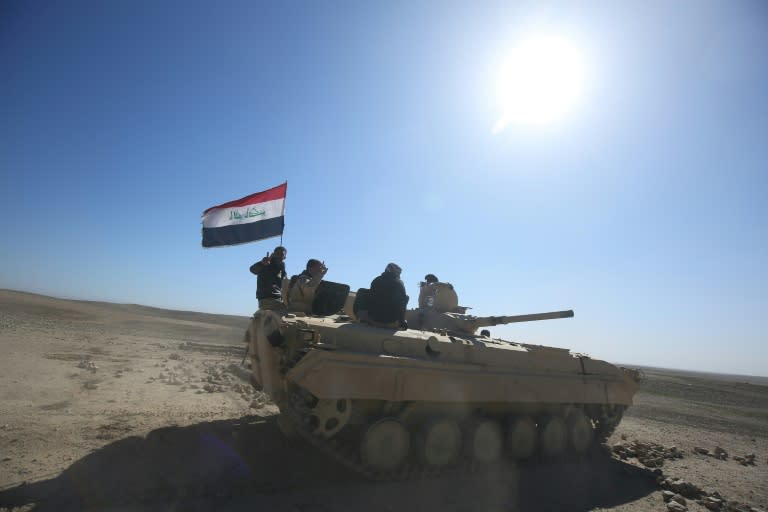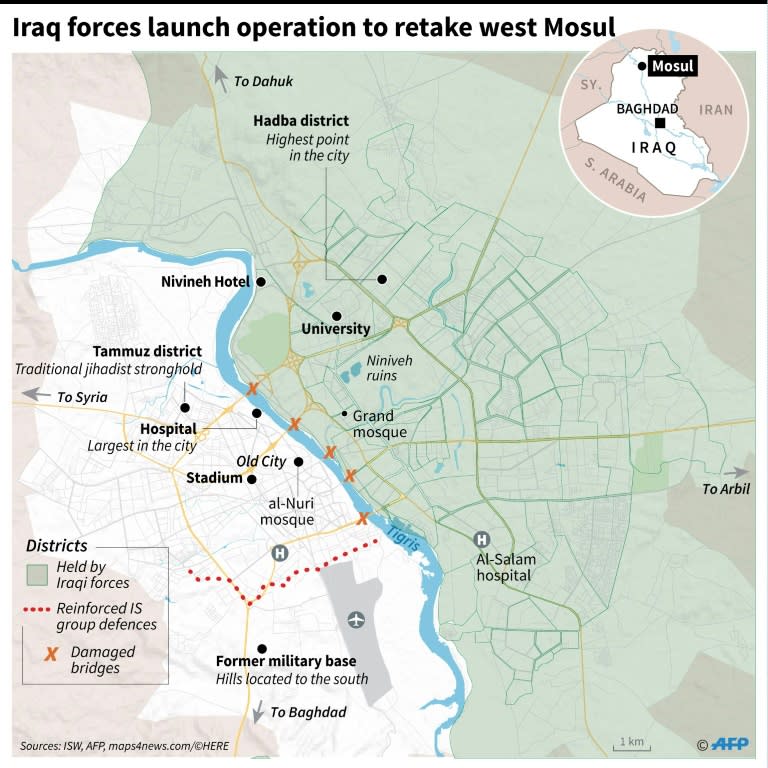Iraq forces battle IS to close in on Mosul's west bank
Iraqi forces backed by jets and helicopters battled their way towards southern Mosul on Monday and prepared to take on the Islamic State group's stronghold in the city's west bank. The fresh push in the four-month-old operation to retake Mosul has sparked fears for 750,000 trapped civilians who risk being killed if they try to flee and starvation if they stay. Federal police forces reached the Aqrab checkpoint on the highway from Baghdad, a spot that marks the southern entrance to Mosul and from which the city is clearly visible. "Today we are standing in Aqrab. It is very important because it is considered to be Mosul's southern gate," Lieutenant General Haider al-Mtoury, of the federal police, told an AFP reporter. He said his forces faced many IS car bombs and suicide bombers as they advanced to within barely two kilometres (just over a mile) of the city limits. Iraqi forces also secured a strategic area known as the Al-Buseif hills near Mosul airport, which lies on the southern approach to the city. Meanwhile, Hashed al-Shaabi (Popular Mobilisation) paramilitaries pushed north on their desert front further west and reached the road linking Mosul to Tal Afar, a town to the west which is still under IS control. That will further isolate what senior US officials said Monday were the 2,000 IS fighters still left inside Mosul. The assault launched on Sunday marks a new phase in the broad operation that began on October 17 to retake Mosul, Iraq's second city and the jihadists' last major stronghold in the country. Its recapture would deal a death blow to the "caliphate" IS chief Abu Bakr al-Baghdadi proclaimed in the city in June 2014 but which has been shrinking steadily for two years as anti-IS forces advanced. - Mattis in Baghdad - But it took Iraq's most seasoned forces, the elite Counter-Terrorism Service (CTS), two months to retake east Mosul, where IS put up stiffer than expected resistance. Commanders and experts believe the city's west bank of the Tigris river could prove even harder to retake, with the Old City's narrow streets necessitating perilous dismounted raids. IS also "likely has stronger support within western Mosul, and the ISF (Iraqi security forces) are more likely to encounter populations that are wary or hostile", said Patrick Martin, Iraq analyst at the Institute for the Study of War. CTS forces, who have urban warfare experience, were seen heading across the desert to the western side of Mosul on Monday. They are expected to breach west Mosul once other forces have moved up to the city limits. Iraqi forces were receiving support from a US-led coalition that has delivered more than 10,000 munitions on IS targets since the start of the Mosul operation. The new Pentagon chief, James Mattis, made a brief visit to Baghdad Monday to show support for the Iraqi security forces, more than 80,000 of whom have also received training from the coalition since 2014. Confident that the Iraqi forces, with increased support from US and other coalition advisers on the ground, had the upper hand, he said the jihadists were "going to be shown exactly what they are, which is a bunch of murderous relics". Before landing in Baghdad, he told reporters the United States was not about to plunder Iraq's oil reserves. US President Donald Trump repeatedly said both while campaigning and since his election that America, whose troops occupied Iraq for years, should have "taken" the oil. "All of us in America have generally paid for gas and oil all along, and I am sure that we will continue to do so in the future," Mattis said. "We are not in Iraq to seize anybody's oil." - Coalition staying - He also said he was confident Iraq's people and leadership "recognise what they are up against and the value of the coalition". The commander of the 60-nation US-led coalition, which has more than 9,000 forces deployed in Iraq, was more explicit and said he expected the coalition to stay in the country after Mosul is retaken. "I don't anticipate that we will be asked to leave by the government of Iraq immediately after Mosul," Lieutenant General Stephen Townsend told reporters. As Iraqi forces advanced on besieged jihadists in Mosul, fears grew for the estimated 750,000 civilian also trapped there with dwindling food supplies. Save the Children said on Sunday that all parties should protect the estimated 350,000 children among them. "This is the grim choice for children in western Mosul right now: bombs, crossfire and hunger if they stay -- or execution and snipers if they try to run," said the charity's Iraq director, Maurizio Crivallero. More than half a million residents stayed home when Iraqi forces entered east Mosul to battle IS there, leading to smaller displacement than initially feared. But the aid community said the assault on west Mosul could cause a bigger exodus, and the UN said it was building more camps around the city.

 Yahoo Finance
Yahoo Finance 



